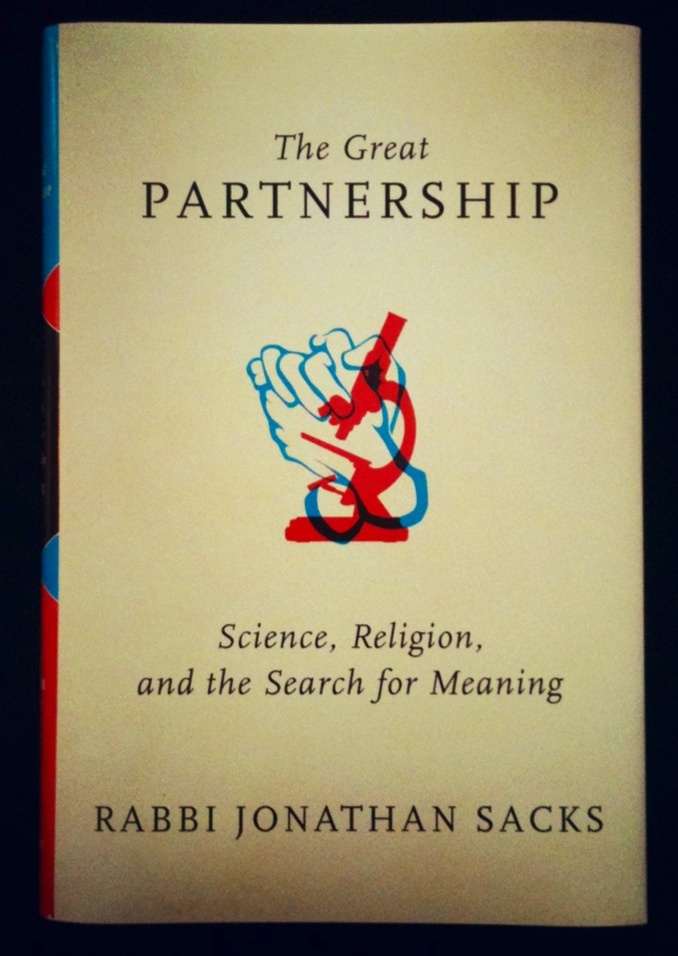
Jonathan Sacks’s The Great Partnership: Science, Religion, and the Search for Meaning is getting a hardback release in the US from Random House (it’s been out in the UK for a while now). RH’s blurb:
An impassioned, erudite, thoroughly researched, and beautifully reasoned book from one of the most admired religious thinkers of our time that argues not only that science and religion are compatible, but that they complement each other—and that the world needs both.
“Atheism deserves better than the new atheists,” states Rabbi Jonathan Sacks, “whose methodology consists of criticizing religion without understanding it, quoting texts without contexts, taking exceptions as the rule, confusing folk belief with reflective theology, abusing, mocking, ridiculing, caricaturing, and demonizing religious faith and holding it responsible for the great crimes against humanity. Religion has done harm; I acknowledge that. But the cure for bad religion is good religion, not no religion, just as the cure for bad science is good science, not the abandonment of science.”
Rabbi Sacks’s counterargument is that religion and science are the two essential perspectives that allow us to see the universe in its three-dimensional depth. Science teaches us where we come from. Religion explains to us why we are here. Science is the search for explanation. Religion is the search for meaning. We need scientific explanation to understand nature. We need meaning to understand human behavior. There have been times when religion tried to dominate science. And there have been times, including our own, when it is believed that we can learn all we need to know about meaning and relationships through biochemistry, neuroscience, and evolutionary psychology. In this fascinating look at the interdependence of religion and science, Rabbi Sacks explains why both views are tragically wrong.
Look, I’ll be frank—I’m hardly a fan of the so-called “new atheists,” but that’s not what this book is really about. It’s really about trying to restore an anchoring metaphysical center—a god, namely, Sacks’s god—despite the progress made by science and philosophy. What I find repellent about Sacks’s book is the idea that only religion can provide a logical, meaningful answer to “why we are here.” I have no problem with the coexistence of religion and science, but that’s not what Sacks wants. He wants religion to dominate. Anyway, clearly I’m not enthusiastic, but if you’re interested, here’s a proper review.

We got here by by traversing a marsh fraught with fearsome beasts and dragons. Why go back that way now, now that we can tell the difference between fairy tale and good science? The closest I have found to explaining the god theory is Buddhism’s self-projection observations and the Veda’s metaphors. Buddhism in its non-religious form is the science of the mind and better explains thought and behavior than modern psychology. Based more on physics than morality. There is no sin but there is action from ignorance with the subsequent results of cause and effect. The Hindu metaphor that says that our universe is as one bubble of foam on a beach of infinite ‘creation’ and ‘eternal’ time. We are dreams that the sleeping god Brahma is having and when she awakens all existence will be destroyed and we will be subsumed into one divine being. As far as meaning in one’s individual life, I think that only the individual can answer that himself through the actions of his daily existence. The journey is the destination. The Buddha ended his journey by sitting under a tree and thinking things over, and then thinking his thoughts over, and finally, by being still long enough that the ripples of thought in his mind smoothed into the surface of a ‘perfect’ mirror and he could see himself.
I suppose that a ‘theology’ of atheism might provide guidance to some, but as above, I came that way a long time ago and see no purpose in going that way again even if I am better prepared. There are more mountains to climb and more beaches to splash and play in along this pathway to death, which is the destination of each and every one of us, and when we reach that bar, we cannot return to play some game that we missed out on along the way.
LikeLike
And they built a god in their own image and they called it Frankenstein.
I like my science straight, no chaser, no ice, no buffer.
I like my religion spiritual, no dogma, no euphemisms. If I think of a creator, then I know that this orb was created to make possible the performance above, ‘…love is the banquet on which we feed…’, and that my body was created to house my soul so that I could hear such ecstasy. The things of this world are too soon gone. Pity the poor soul who wishes he had played more when he was material.
LikeLike